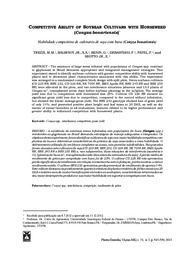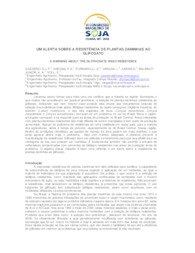Identification and Characterization of Glyphosate-Resistant Weeds in Brazil
Identification and Characterization of Glyphosate-Resistant Weeds in Brazil

Photo: VARGAS, Leandro
GM crops that are resistant to glyphosate have created a new scenario in Brazilian agriculture. Glyphosate has been generally used mainly in soybean farms in the Brazilian states of Rio Grande do Sul, Santa Catarina and Paraná. In the state of São Paulo, glyphosate is widely used in orchards, especially citrus ones. The repeated use of glyphosate has given rise to cases of weed resistance to this herbicide in different places of the country. The trend is that new glyphosate resistant crops such as maize are launched in the market soon. In this scenario, there is going to be an increase in the use of glyphosate, and in upcoming years the use of crop rotation and succession of glyphosate resistant crops will be a common practice. There is the problemof glyphosate resistant and tolerant weeds. Glyphosate resistant Lolium, Conyza and Digitaria species have already been identified in Brazil and constitute a serious problem in soybean and citrus crops. Thus, the goals of this project are: understanding the processes that lead to glyphosate resistance, identifying existing resistant species, regionally locating (mapping) where their foci of occurrence; characterizing resistance mechanisms; and establishing prevention, management and control strategies for resistant species.
Ecosystem: Extreme South, Cerrados Region, Pinheirais Region
Status: Completed Start date: Fri Apr 01 00:00:00 GMT-03:00 2011 Conclusion date: Mon Nov 30 00:00:00 GMT-03:00 2015


